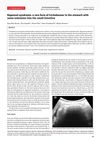 58 citations,
July 2007 in “Clinics in Dermatology”
58 citations,
July 2007 in “Clinics in Dermatology” Tattooing helps treat skin conditions, reconstruct nipple-areola, mark radiation fields, and locate lesions.
 58 citations,
March 1985 in “Journal of The American Academy of Dermatology”
58 citations,
March 1985 in “Journal of The American Academy of Dermatology” The document concludes that electrolysis and thermolysis can permanently remove hair but calls for better regulation to ensure safety, and notes a possibility of hair regrowth and rare complications.
 50 citations,
December 2020 in “Bioactive Materials”
50 citations,
December 2020 in “Bioactive Materials” Wound dressing absorbs fluid, regenerates hair follicles, and heals skin burns.
 48 citations,
July 2001 in “Clinics in Dermatology”
48 citations,
July 2001 in “Clinics in Dermatology” Cosmetics enhance beauty, fix defects, and intimidate enemies, with varying cultural standards and alternative methods.
 47 citations,
July 2013 in “Pharmacological Reviews”
47 citations,
July 2013 in “Pharmacological Reviews” Regenerative pharmacology, which combines drugs with regenerative medicine, shows promise for repairing damaged body parts and needs more interdisciplinary research.
 39 citations,
November 2017 in “Journal of The American Academy of Dermatology”
39 citations,
November 2017 in “Journal of The American Academy of Dermatology” The document suggests using standardized methods to track and measure hair loss in alopecia areata, including patient self-assessment and a 50% improvement in specific scores as a treatment goal.
 39 citations,
September 2017 in “The Open Rheumatology Journal”
39 citations,
September 2017 in “The Open Rheumatology Journal” Low serum complement levels in SLE patients don't always match with disease flares; monitoring C3 and C4 is useful, but cell-bound complement products might better indicate disease activity.
 36 citations,
January 2012 in “International Journal of Trichology”
36 citations,
January 2012 in “International Journal of Trichology” Losing eyelashes or eyebrows can be a sign of many different health problems and needs a careful approach to treat effectively.
 27 citations,
July 1994 in “Human Pathology”
27 citations,
July 1994 in “Human Pathology” Understanding chaos and control mechanisms in disease can improve diagnosis and prediction in medicine.
 25 citations,
May 2019 in “Heliyon”
25 citations,
May 2019 in “Heliyon” Hair treatments cause significant structural changes, especially with excessive heat, regardless of ethnicity.
 21 citations,
April 2010 in “Molecular Medicine Reports”
21 citations,
April 2010 in “Molecular Medicine Reports” Zinc supplementation may help improve treatment outcomes for chronic hepatitis C.
 17 citations,
March 2021 in “Expert Opinion on Biological Therapy”
17 citations,
March 2021 in “Expert Opinion on Biological Therapy” Use PRP and ASC-BT for hair loss and wound healing, but more research needed.
 14 citations,
November 2020 in “International Journal of Biological Macromolecules”
14 citations,
November 2020 in “International Journal of Biological Macromolecules” Mushroom-based scaffolds help heal skin wounds and regrow hair.
 11 citations,
January 2013 in “Ocular Surface”
11 citations,
January 2013 in “Ocular Surface” The document concludes that modern ocular cosmetics enhance beauty and eyelash health, with safe practices and regulations being important.
 10 citations,
February 2011 in “Journal der Deutschen Dermatologischen Gesellschaft”
10 citations,
February 2011 in “Journal der Deutschen Dermatologischen Gesellschaft” The document concludes that proper diagnosis and evidence-based treatments are crucial for managing hair diseases, and psychological support for patients is important.
 10 citations,
January 1994 in “Advances in pharmacology”
10 citations,
January 1994 in “Advances in pharmacology” New drugs targeting DNA enzymes show promise for cancer treatment but have side effects like immune system suppression and hair loss.
 6 citations,
April 2023 in “Frontiers in plant science”
6 citations,
April 2023 in “Frontiers in plant science” Certain bacteria can boost lentil growth and improve soil used for farming.
 6 citations,
October 2018 in “Lasers in Medical Science”
6 citations,
October 2018 in “Lasers in Medical Science” Low-level laser therapy using near-infrared light may help heart conditions and promote healing by releasing nitric oxide.
 6 citations,
January 2018 in “Acta dermatovenerologica Alpina, Pannonica et Adriatica (Tiskana izd.)”
6 citations,
January 2018 in “Acta dermatovenerologica Alpina, Pannonica et Adriatica (Tiskana izd.)” An 8-year-old girl with Rapunzel syndrome had a hairball removed from her stomach and intestines and recovered well after surgery.
 5 citations,
May 2023 in “Frontiers in immunology”
5 citations,
May 2023 in “Frontiers in immunology” Environmental factors like diet and vitamin levels, especially Vitamin D, can affect autoimmune diseases differently, with lifestyle changes potentially improving outcomes.
 5 citations,
February 2010 in “Facial Plastic Surgery Clinics of North America”
5 citations,
February 2010 in “Facial Plastic Surgery Clinics of North America” The document concludes that understanding hair loss and considering medical treatments like minoxidil and finasteride before surgery is important, especially for young patients with rapid hair loss, and that hairline design varies among different ethnicities.
 4 citations,
April 2020 in “Facial Plastic Surgery Clinics of North America”
4 citations,
April 2020 in “Facial Plastic Surgery Clinics of North America” Hair loss in women is complex to diagnose and treat, and hair restoration should be done by experts. Using minoxidil before surgery can help manage post-surgery hair shock loss. The Follicular Unit Transplantation method is recommended for women due to its speed, no need for shaving, and better graft quality. Strategies like L, T, and reverse L patterns can help restore central hair density, and regenerative methods can improve graft survival in hair transplants.
 4 citations,
January 2018 in “Elsevier eBooks”
4 citations,
January 2018 in “Elsevier eBooks” Hormones are crucial for regulating body functions and imbalances can lead to health issues.
 4 citations,
July 2017 in “British Journal of Dermatology”
4 citations,
July 2017 in “British Journal of Dermatology” The study identified the top 10 most important areas for future hair loss research.
 3 citations,
January 2012 in “Wageningen Academic Publishers eBooks”
3 citations,
January 2012 in “Wageningen Academic Publishers eBooks” Hair health depends on various factors and hair loss can significantly affect a person's well-being; understanding hair biology is key for creating effective hair care treatments.
 2 citations,
September 2023 in “Frontiers in sustainable food systems”
2 citations,
September 2023 in “Frontiers in sustainable food systems” Traditional knowledge of edible oil-producing plants in Sinja Valley is declining due to outmigration and sociocultural changes.
 2 citations,
October 2022 in “International journal of Ayurvedic medicine”
2 citations,
October 2022 in “International journal of Ayurvedic medicine” Licorice has many traditional health benefits, but more research is needed to fully support these claims.
 2 citations,
May 2021 in “Scientific Reports”
2 citations,
May 2021 in “Scientific Reports” Stress is likely causing hair loss in Formosan macaques.
 2 citations,
July 2014 in “Irish Journal of Medical Science”
2 citations,
July 2014 in “Irish Journal of Medical Science” The meeting discussed medical findings, including benefits of certain treatments for cancer and heart conditions, and highlighted issues like poor adherence to preventive measures and skill gaps among interns.
 2 citations,
September 2007
2 citations,
September 2007 Surgical hair restoration involves moving hair from a non-balding area to a balding area, with the transplanted hair not subject to male pattern baldness. Medications can slow hair loss and regrow some hair, but successful treatment needs careful planning, skill, and ethical responsibility due to progressive hair loss and limited donor hair.






























